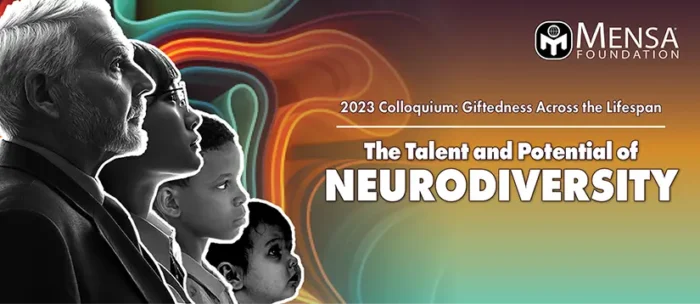What does it mean to be intelligent?
It feels like a question we should have answered by now. But the truth is—we haven’t. IQ is helpful. It gives us a glimpse into how someone processes information, solves problems, or reasons logically. That’s valuable. But it’s not the full picture. Not even close.
At the Mensa Foundation, we’re not trying to replace IQ.
We’re trying to widen the lens. To talk about what intelligence really looks like—when it shows up in people’s lives, their choices, their creativity, and their impact.
This week, I had the privilege of presenting a new strategic vision to our Board of Trustees. It’s more than a roadmap—it’s a reset. A rethink. A way to ask better questions about how we identify, define, and support human potential.
“Human flourishing is not a mechanical process; it’s an organic one. We cannot predict the outcome of human development. All we can do, like a farmer, is create the conditions under which they will begin to flourish.” – Sir Ken Robinson
And honestly? It’s long overdue. But why now?
We’re living in a moment where artificial intelligence is evolving rapidly. Machines are writing code, analyzing data, even generating art. And yet, for all the excitement around artificial intelligence, we still haven’t fully defined human intelligence.
In fact, a recent study by Ilic and Gignac (2024) explored whether large language models (LLMs) demonstrate something similar to what humans have long called “general intelligence.” They found strong evidence of shared ability across tasks in these systems—what they call “Artificial General Ability.” But even then, they warned against oversimplifying:
“It would be premature—and potentially misleading—to equate these statistical patterns with true intelligence as we understand it in humans.” – Gignac & Szodorai, 2024
If machines can mimic certain outputs, then what truly makes intelligence human? And how do we make sure we’re not leaving the most brilliant people—especially those who think differently—behind?
Here’s what we believe:
• Intelligence is deeply human. Often hidden. Sometimes misunderstood.
• It’s shaped by environment and experience. It’s contextual.
• And it’s not just about capacity—it’s a state of being.
What our research told us
In 2023, we conducted the largest study of gifted and neurodivergent individuals that the Foundation has ever undertaken—over 3,400 people participated. And what they told us was loud and clear:
• 75% reported moderate or high levels of unmet needs
• 32% struggle with mental health challenges
• Over 80% feel misunderstood or devalued
• Only 18% regularly experience intellectual challenge
That’s not just disappointing. It’s a warning. We are not doing enough to support the people who think deeply, feel intensely, and often see the world in ways that others don’t.
And the scientific community knows it too.
There is no universally accepted definition of intelligence… and this lack of consensus impedes scientific progress.” — Gignac & Szodorai, 2024
If we can’t agree on what intelligence is, how can we hope to nurture it—or recognize it—when we see it?
Where we’re headed
That’s why we’re developing a series of new initiatives that push the conversation—and the mission—forward.
Here’s a look at what’s coming:
• The Mensa Foundation Mentor – A guided, AI-powered thinking partner designed to help gifted and neurodivergent individuals reflect, grow, and thrive
• The Conundrum Challenge –Through rotating prompts, ranging from global questions to local challenges, participants apply their insight and creativity to explore big ideas and propose real-world solutions.
• The Mensa Foundation Summit – A reimagined event (formerly our Colloquium) that brings together researchers, educators, and innovators
• “Excellence in Programming” – Builds on the success of Excellence in Reading, starting with science and expanding into new subjects—with a long-term vision to make the program accessible to learners of all ages.
• The Certificate and Network Program – To connect gifted educators and neurodiversity advocates with tools, training, and a supportive community
• The Innovation Hub – Funding big ideas through early-stage grants that explore and apply human intelligence in new ways
Each of these efforts is grounded in a simple truth: intelligence isn’t one thing. It’s many things.
And when we recognize that, we open the door to better support, more inclusive systems, and deeper understanding—for everyone.
Let’s build it together
Here’s the thing: the Mensa Foundation can’t do this alone. And we don’t want to.
Neuroscience, psychology, education, artificial intelligence, the arts, economics, and public health all have a stake in how we define and support human intelligence.
That’s why this isn’t just our next initiative.
It’s an invitation.
We believe it’s time to restart the conversation on human intelligence.
And in doing so, we’re not only exploring how people contribute to the world—we’re rethinking what shapes their experience within it.
We’re just getting started.
If you’re curious, inspired, or ready to collaborate—we’d love to hear from you.

John Thompson is the Director of Development & Impact at the Mensa Foundation, where he helps lead strategic initiatives to expand the Foundation’s reach, develop its mission, and mobilize support for human intelligence in the modern era. With a background in philanthropy, John bridges bold vision with real-world execution—helping the Foundation elevate how intelligence is understood, nurtured, and celebrated across disciplines and communities.










Comments (0)